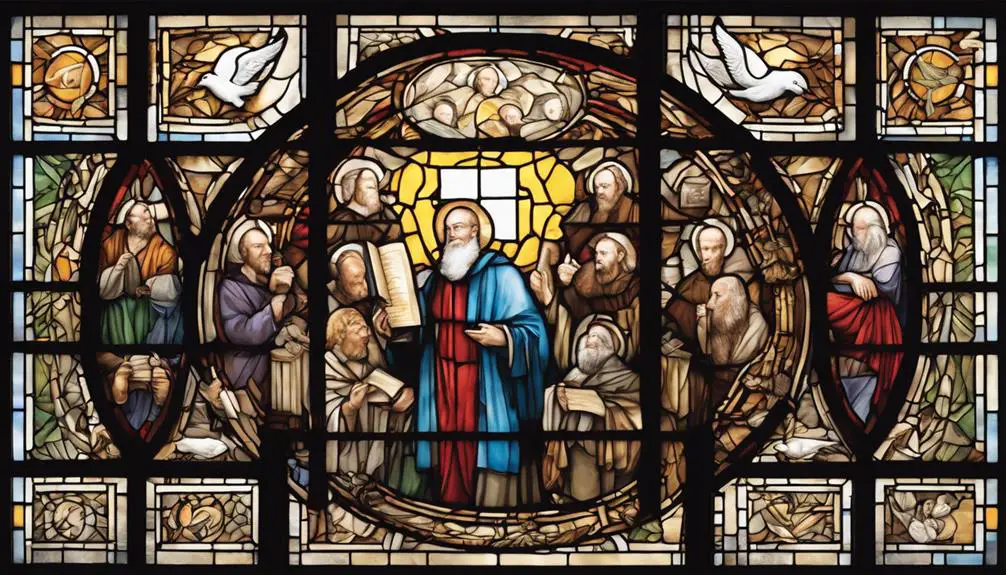Yielding deep insights, the number 5 in the Bible symbolizes grace and redemption, revealing layers of divine wisdom.

Meaning of the Number 5 in the Bible
In the digital age, it's easy to overlook the profound impact of analog symbols, and the number 5 in the Bible is a compelling example. You'll find it woven throughout scripture, from the Pentateuch, the first five books that lay down God's laws, to the five wounds of Christ, symbolizing his sacrifice for humanity.
This number often hints at grace, redemption, and the fullness of God's gifts to the faithful. As we explore its significance, you'll discover layers of meaning that could transform your understanding of biblical texts and the divine messages they hold.
Why is the number 5 so pivotal? The answers may surprise you.
Key Takeaways
- The number 5 symbolizes God's grace and humanity's need for redemption, reflecting divine favor and salvation.
- It represents the completeness of God's Law through the Pentateuch, foundational to Judeo-Christian ethics.
- The Five Wounds of Christ highlight the depth of sacrificial love and the cost of human redemption.
- In prophecy, the number 5 can signify periods of trial or transformation, emphasizing divine guidance and completeness.
The Pentateuch: God's Law

Exploring the Pentateuch reveals its foundational role as God's Law, guiding the moral and spiritual conduct of believers. Traditionally attributed to Moses' authorship, these first five books of the Bible serve as the bedrock of Judeo-Christian ethics, laying out not only the history of God's people but also the detailed laws governing their relationship with God and each other. This scholarly consensus underscores the significance of Moses in delivering these laws, further emphasized through the narrative of the Tabernacle's construction.
The construction of the Tabernacle, as detailed in Exodus, symbolizes a deeper, spiritual architecture—an intricate blueprint for approaching the divine. It's not merely an account of physical construction but a metaphorical representation of creating a space for God amidst His people. This narrative, under Moses' directive, illustrates the meticulous care in ensuring that God's presence is honored and revered, reflecting the broader theme of the Pentateuch in establishing a covenant community centered around divine laws and presence.
Analyzing these elements, it becomes clear that the Pentateuch's significance extends beyond historical or literary value; it's a seminal text defining the contours of sacred relationship and moral obligation.
Five Wounds of Christ
Reflecting on the Pentateuch's emphasis on divine presence and covenant, we now turn our attention to the Five Wounds of Christ, a profound symbol of sacrifice and redemption in Christian theology. The crucifixion of Jesus Christ is central to Christian faith, marking the culmination of God's plan for humanity's salvation. The Five Wounds, received by Christ during his crucifixion, hold deep theological significance, representing the extent of his suffering for human sins.
The Five Wounds consisted of:
- Two in his hands
- Two in his feet
- One in his side
This numeric symbolism isn't arbitrary; it reflects the thoroughness of Christ's sacrifice. Each wound symbolizes a different aspect of suffering and redemption, collectively embodying the physical and spiritual agony Christ endured.
Crucifixion significance in Christianity can't be overstated. It's a historical and spiritual event that showcases the depth of divine love and the extreme cost of human redemption. The representation of suffering through the Five Wounds underscores the gravity of Christ's sacrifice, inviting believers to ponder the profound love and commitment that drove such an act. This contemplation encourages a deeper understanding of faith, drawing connections between biblical symbolism and the foundational beliefs of Christianity.
Grace and Redemption

Delving into the concept of grace and redemption, it's crucial to recognize how these elements are intricately woven into the fabric of Christian theology, offering a transformative path for believers. The number 5 in the Bible often symbolizes divine favor and human frailty, echoing the dual aspects of grace and redemption.
Aspect |
Description |
Biblical Reference |
|---|---|---|
Grace |
Unmerited divine favor towards humanity |
Ephesians 2:8 |
Redemption |
Deliverance from sin through sacrifice |
Romans 3:24 |
Human Frailty |
Weakness that necessitates divine grace |
Psalm 103:14 |
Transformation |
The process of renewal through grace |
2 Corinthians 5:17 |
This table encapsulates the dynamic interplay between divine favor and human frailty. Grace, as an unmerited favor, underscores the generosity of the divine towards humanity, despite our inherent weaknesses. Redemption, on the other hand, marks the act of being saved from the consequences of sin, highlighting a journey from fallen nature to renewed existence. The concept of human frailty acknowledges human limitations, emphasizing the need for divine intervention. Lastly, transformation illustrates the outcome of grace and redemption—a metamorphosis from old to new, from bound to freed. Through this analysis, it's evident that the number 5 not only symbolizes but also encapsulates the essence of grace and redemption in the biblical narrative.
Symbolism in Prophecy
In biblical prophecy, the number 5 frequently emerges as a symbol with deep, multifaceted meanings, reflecting complex divine messages to humanity. This symbolism is particularly evident in Daniel's visions and the broader apocalyptic imagery found throughout scripture. The number 5's presence in these prophecies often signifies moments of transition and transformation, carrying with it layers of interpretation that scholars and theologians have pondered for centuries.
When analyzing the symbolism of the number 5 in biblical prophecy, it's crucial to consider its role in:
- Emphasizing the completeness of divine revelation: The number often appears in contexts that suggest a totality of knowledge or understanding that's being imparted.
- Highlighting periods of testing or trial: Just as the Israelites wandered for 40 years (5×8), the number 5 can symbolize times of preparation and purification.
- Signaling grace in the midst of judgment: In prophetic narratives, the appearance of 5 can indicate the intertwining of mercy with divine judgments.
These dimensions of the number 5's symbolism in prophecy underscore its significance in conveying the nuances of God's messages to humanity, especially within the rich tapestry of Daniel's visions and apocalyptic literature.
Fivefold Ministry Gifts

Building on the understanding of the number 5's symbolism in biblical prophecy, it's crucial to explore its manifestation within the context of the Fivefold Ministry Gifts. These gifts, pivotal for the church's growth and unity, embody Apostolic significance and define distinct Ministerial roles. The Apostle Paul outlines these gifts in Ephesians 4:11-13, suggesting a divine blueprint for church leadership and function.
To delve deeper, let's examine these gifts and their roles:
Gift |
Function |
Apostolic Significance |
|---|---|---|
Apostle |
Foundation layers, church planters |
Authority, pioneering |
Prophet |
Revealers of God's will, truth bearers |
Guidance, correction |
Evangelist |
Spreaders of the Gospel, soul winners |
Expansion, outreach |
Pastor |
Shepherds, caretakers of the flock |
Nurturing, protection |
Teacher |
Explain Scripture, ensure doctrinal integrity |
Education, clarity |
Each role is essential, ensuring the church's robustness through leadership, guidance, expansion, nurturing, and education. As you engage with these Ministerial roles, you're invited to appreciate their collective contribution to fulfilling the church's Apostolic calling, firmly rooted in the symbolism and significance of the number 5.
Frequently Asked Questions
How Does the Number 5 Relate to the Creation Story in Genesis Outside of the Pentateuch Context?
You're asking how the number 5 relates to the Genesis creation story, specifically outside the Pentateuch context.
On the fifth day, the narrative details God creating sea creatures and birds, signifying a phase of filling the earth with life.
This moment in the Genesis creation account emphasizes a progression towards complexity and diversity in life forms, illustrating a pivotal step in the unfolding of the natural order, independent of broader numerical symbolism.
Are There Significant Occurrences of the Number 5 in the Lives of Biblical Figures Not Directly Associated With Christ's Wounds, Grace, and Redemption Narratives?
You're diving into uncharted territories, much like exploring a new planet.
Yes, you'll find significant occurrences of the number 5 in the lives of biblical figures outside Christ's narrative. For instance, David's stones, picked to battle Goliath, resonate with this theme.
Similarly, Abraham's visitors, a group of three angels and two humans, also align with this pattern, marking pivotal moments that aren't just about grace but also about faith and providence.
In What Way Does the Number 5 Appear in the Architectural Designs or Measurements Within the Bible, Such as the Construction of the Tabernacle or Solomon's Temple, Not Covered Under the Symbolism in Prophecy?
You'll find the number 5 cropping up in the Bible's architectural designs, particularly in the construction specifics of the Tabernacle and Solomon's Temple.
For instance, the Tabernacle curtains were cleverly designed in sets of five, symbolizing unity and structure.
Similarly, Solomon's measurements for various temple parts often incorporated the number 5, reflecting a divine pattern.
These instances highlight a meticulous attention to detail and a deeper, symbolic significance within the sacred architecture.
Does the Number 5 Have a Notable Presence in the Dietary Laws or in the Feast Days of Israel, Beyond Its Representation in God's Law and the Fivefold Ministry Gifts?
You're diving into the feast symbolism and dietary significance like a detective unraveling a mystery. While the number 5 isn't overtly prominent in these areas, its subtle presence can't be ignored.
In exploring dietary laws and feast days, you'll find that, beyond explicit mentions, the essence of 5 weaves through traditions and practices, enriching the texture of observance.
This analytical journey reveals layers of meaning, demonstrating a nuanced understanding of ancient rituals.
How Is the Number 5 Used in the Apocryphal Books of the Bible or in Non-Canonical Texts, Which Might Not Be Discussed in the Standard Sections of a Biblical Article?
You're diving into how the number 5 plays out in apocryphal symbolism and non-canonical narratives, stepping beyond the usual discussions. These texts often weave numbers into their stories with rich layers of meaning, subtly different from canonical texts.
Analyzing these, you'll uncover unique interpretations and connections that these lesser-discussed writings offer. It's a scholarly journey, aiming to reveal how these texts contribute to the broader tapestry of biblical numerology.
Conclusion
In conclusion, you've journeyed through the symbolic richness of the number 5 in the Bible, from the foundational Pentateuch to the five wounds of Christ, embodying grace and redemption. This number's role in prophecy and the fivefold ministry gifts underscores its divine significance.
Despite being millennia apart, the ancient wisdom encoded in the number 5 still resonates today, offering insights into spiritual truths and divine order. Analyzing these symbols reveals the Bible's intricate tapestry, weaving together history, prophecy, and spiritual guidance.



Sign up